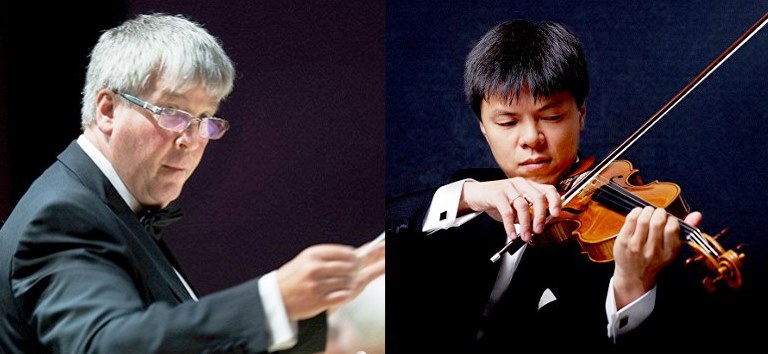 United Kingdom Beethoven, Bruch, Haydn: Ten Tors Orchestra, Simon Ible (conductor), Leland Chen (violin), Tavistock Parish Church. 4.2.2017. (PRB)
United Kingdom Beethoven, Bruch, Haydn: Ten Tors Orchestra, Simon Ible (conductor), Leland Chen (violin), Tavistock Parish Church. 4.2.2017. (PRB)

Beethoven – Egmont Overture
Bruch – Violin Concerto No. 1 in G minor
Haydn – Symphony No. 104 in D major, “London”
Artistic Director and Conductor, Simon Ible—Director of Music of Peninsula Arts, Plymouth University—writes in the programme that Ten Tors Orchestra (TTO), formed back in December 1998, initially received its funding from various bodies, as well as generous support from local individuals and businesses. In 2005 it was invited to become the resident ensemble of Peninsula Arts, performing both classical and new music, the latter in each year’s Contemporary Music Festival at the University. Recently, though, this partnership has come to an end, and the orchestra is no longer viable as such, especially in today’s economic climate. So while this year’s annual Ten Tors expedition will once more be taking place in a couple of months, and youngsters will once again pit their strengths and survival skills against whatever Dartmoor can throw at them as they trek across the moorland terrain, the orchestra that proudly bore the same name for almost twenty years has now come full circle to give its final concert in Tavistock—the same town where it started out.
The Parish Church once more provided the ideal setting and acoustics for the event, and the packed audience was treated to an absolute treat of three popular classics. Opening with Beethoven’s imposing Egmont Overture, from the very first bars the extra resources marshalled for the orchestra’s swan song made a telling impression under the assured and confident leadership of Mary Eade. Just to hear the full four-horn chords close to the end was exhilarating enough, but the unbridled excitement generated in the fast closing section was simply electrifying.
Taiwanese violinist Leland Chen, who had appeared with TTO on five previous concerts—reviews of three of these appear on this website in 2013, 2014, and 2015 respectively—then proved the perfect protagonist in Bruch’s gloriously nostalgic First Violin Concerto. After the lyrical opening of the Vorspiel, many performances then tend to emphasise the allegro, rather than the moderato, aspect in the subsequent main section, whereas the initial Allegro moderato should still be rendered as “Moderately quick or lively”—in essence slower than allegro, but a bit faster than moderato. Correctly taken in accordance with the composer’s intention that the same tempo effectively obtains throughout most of the Vorspiel, the main section then has tremendous poise, only heightened by the slightly faster section near the end, before the brief return to the calm of the opening. But when rushed, or taken in two-in-a-bar, despite the clear four beats per bar intention of the time signature, a great deal of the sheer drama and angst is lost.
The much-loved slow movement that followed was full of heartfelt emotion, yet never merely just sentimental, where Chen’s rich tone and sensitive use of portamento had such an important part to play. The gypsy-like nature of the finale ensured that the work ended on a real high, where the soloist’s superb technique made light work of any difficulties along the way. Performances of this work—which, much to the composer’s frustration has become a perennial audience favourite, largely at the expense of his other works—do not come much better than this.
Essentially an extendable chamber orchestra, TTO has always excelled in its performances of Haydn symphonies, so it was the perfect choice to end with the London Symphony, the composer’s last work in the genre. This was a scintillating performance. The character and specific nuances of each of the work’s four movements were finely pointed, each section of the orchestra absolutely rising to the occasion, from the robust and sensitive support of the strings, neat articulation from woodwind whether solo or in combination, sure-footedness and attack from brass, and well-balanced reinforcement from timpani.
Despite the somewhat party-atmosphere, which saw many old faces in the audience, from former TTO leader and erstwhile Academy of St Martin in the Fields violinist Malcolm Latchem to principal violist Keith Lovell (formerly with Dartington and Allegri String Quartets), this was still a sad occasion—in fact, the end of an era. For almost twenty years, players, trustees, fund-raisers, supporters, stage-crew, all have filled a vital gap in the provision of quality symphonic music in Plymouth and the South West Peninsula, all, of course, instigated by the drive, vision, and musical expertise of Artistic Director and Conductor Ible.
One of Ible’s greatest attributes has always been effective programming, aimed at making the very best use of available resources on the night, while still creating interest and diversity in the repertoire chosen. Indeed, each of the three works in TTO’s grand finale had one thing in common. They all began in a minor key, and ended in the major, or, as the musical youngster might say, “they started off sad, but ended happy!”
Hopefully this will be similarly reflected over the coming months, when new ensembles like Plymouth University’s Peninsula Arts Sinfonietta come of age, and can take over where TTO left off. Only time will tell, they say.
Philip R Buttall
